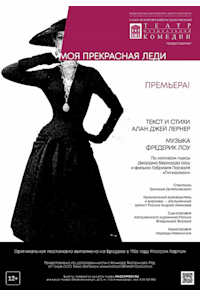Rainy London in the middle of the 20th century... An unexpected meeting on one of the streets of the prim British capital becomes decisive for the young saleswoman of violets, Eliza Doolittle. Overnight, her ordinary, unremarkable life of a street flower girl is turned upside down: in the past there is an unsightly life, the need to support a drunken father who lives at her expense, and think about the future. The young gentleman Henry Higgins, under the same roof with whom she once had to wait out the trademark London rain, offers her ... no, not at all a hand and heart - much more: a potential place in a large and beautiful flower shop. This is the ultimate dream of Eliza. And in order to achieve what she wants, the girl agrees to take a few lessons in good manners and proper speech from a secular dandy. Whatever that means...
The new production at the Theater of Musical Comedy is the second in the history of the theater to address "My Fair Lady". The first performance staged by Andrei Tutyshkin in 1964 became a real hit for a decade and a half thanks to a wonderful ensemble cast. The incomparable Zoya Vinogradova, whom the critics called "the best lady of theatrical Leningrad", Alfred Shargorodsky, Lev Petropavlovsky, Nikolai Yanet shone in it. The performance was recognized as a "victory", primarily because the theater managed to master serious dramaturgy, unusual for the operetta genre.
By "serious dramaturgy" was meant the original source of the libretto: the play by J.B. The show "Pygmalion", which was redesigned for musical theater, retaining the main storylines. The show, in turn, relied on the ancient myth of the sculptor Pygmalion, who fell in love with the ideal statue he created - Galatea.
After the heroes of this story had to sing, Broadway spoke about the birth of a new hit, and some of the numbers of this musical comedy entered the golden fund of the music scene, such as the heroine's famous aria "I want to dance." The play premiered on Broadway in 1956 and ran for 2,717 performances over the next six years. It was a record.
In Russia, the story of "Pygmalion" and "Galatea" of the XX century was appreciated after the release of the film with the participation of Audrey Hepburn. Her Eliza conquered the Soviet audience, despite the fact that all the musical numbers in the film were performed by another actress.
In the 21st century, speaking the language of “emoticons”, pictograms and animated pictures, the question of the purity of the language, which so worried Bernard Shaw, who brought the famous phonetist of his time Henry Sweet in the figure of Pygmalion, seems almost insoluble and even almost impossible. But director Grigory Dityatkovsky does not seek to further bring the characters closer to the realities of today. Remaining in the context of the libretto and even practically in the era fixed in it, he removes the stereotypical masks from the images of Eliza, Higgins, Pickering and other characters, familiar to all famous dramatizations and film adaptations. And although his Eliza diligently does exercises, stuffing her cheeks with pebbles, and learns good manners under the guidance of her enthusiastic teacher, Dityatkovsky is not interested in her success in pronouncing tongue twisters. The focus is on the person and his place,
Grigory Dytyatkovsky:“While working on this material, it was interesting to find the relationship between the rather light music and Shaw's tense-sounding dramaturgy (because, of course, the original is obvious behind the text of the libretto). In these searches, a need arose for small “injections”, which, it seemed to me, could be the texts of Andrei Bely, very consonant with this story, from his “Glossolalia”, a poem about sound. In many ways, it was these texts that shaped the view of the main character. Reading them, I became convinced that Higgins is not just a dry armchair scientist, carrying on incomprehensible and unattractive conversations, but a person illuminated by an idea, an enthusiast and an ascetic. Moreover, only a talented poet can "see the sound" by intuitively penetrating into it. And in a sense, a boy who does not take into account the accepted rules of behavior, carried away by the idea. Eliza, as the object of his experiment, suddenly acquires the freedom of self-perception in the world... But let's not forget that this play cannot be read from the standpoint of domestic relations: after all, the original source contains a myth. He exalts..."



